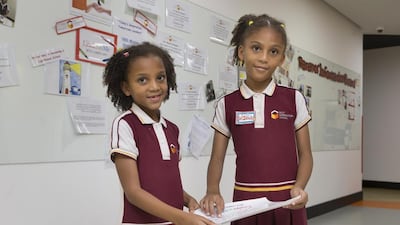DUBAI // From a mock currency and pretend utility bills to a salary that must be carefully spent, a Dubai school is teaching children how to be smart with money and avoid the debt trap that engulfs so many adults today.
The Next Generation School in Al Barsha 3 has started School Economy, which teaches financial literacy by giving pupils a monthly salary from which they pay for expenses such as utilities and rent.
Personal debt in the UAE hit Dh349.9 billion in February, so the programme is important for the financial future of the pupils, who are aged between 7 and 11.
“We involved every child in the classroom,” programme coordinator Pranti Zaveri said.
“They apply for a classroom job, which can be taking care of plants, IT supervisor, custodian, teacher’s messenger, policeman, banker, and so on.
“They get a salary every month, which ranges from Dh10 for a Grade 1 child to Dh500 for a Grade 5 child. We’ve made our own mock currency known as NGS.
“Every child has to pay the rent and utility bills, every class has a bank, every child gets bonuses and fines.”
Ms Zaveri said the children had been smart and responsible.
“We presume that today’s generation are careless, spoilt and don’t respect hard-earned money,” Ms Zaveri said. “When we started our programme, this myth was blown away.
“We’re so amazed and surprised at the way children are so responsible with spending money. We just have to believe in them and give them responsibility.”
Souad Bellili, 33, whose two daughters are in Grades 2 and 3 at the school, thinks the programme is a revelation.
“It’s a wonderful idea. I have seen a stark change in my daughters’ attitude towards spending. They are now realising the value of money and how to use it,” said Mrs Bellili, from France.
Mrs Bellili, whose daughters work as bankers in their classes, said children today — especially those born and raised in Dubai — were blessed with luxuries and technology so they needed to understand the value of money.
“They think money comes easily and can be spent easily,” she said. “Such programmes help children realise the importance of hard-earned money.
“Now my girls think twice before asking for anything, whether it is required or not. This attitude is so amazing.”
Mrs Bellili said parents and schools should work together on such projects, a notion with which her children’s principal agrees.
“Our goal is to inspire students to make meaning of the world in which they live, based on their experiences, and to discover worlds beyond that with which they are familiar,” said Dr Sheryl Steinberg Abukar.
“We want to focus on financial literacy management from a young age. We want them to learn from their own experience. That’s why we created jobs for them so that they learn about responsibility and how to budget their money.”
Dr Steinberg Abukar said her school was ready to support other schools that would like to implement such programmes for their pupils.
Wealth adviser Rasheda Khatun Khan, of Design Your Life, said such school programmes should be mandatory.
“Bringing this into the education system would be super and should be mandatory — like English, maths and science,” she said.
“Education teaches us to get a job and earn good money, but what do you do with it?”
akhaishgi@thenational.ae
* Additional reporting by Dana Moukhallati

